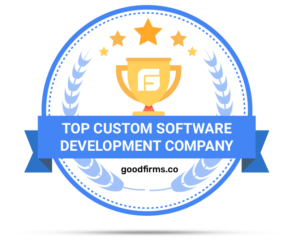Almost every company is a technology company, to some degree. That doesn’t necessarily mean you sell a high-tech product, just that technology like digital tools and mobile experiences play a fundamental role in your strategy. Software products can enable you to operate more efficiently or reach your customers in new ways. Consider a car dealership with an online inventory technology that allows customers a digital-first experience or a credit union with a mobile app for its customers.
As you recognize software needs in your own company, soon enough the debate will arise whether to build or buy a third-party solution. Whether your needs are for a project you’re hoping to turn around in the next several quarters or for long-term, continuous development needs with an extended multi-year roadmap, you should weigh the pros and cons associated with each option as you’re deciding how to best tackle your next software venture.

Building Software: Pros and Cons
Pros
The biggest advantage of building your own software is the ability to customize the solution. Your business has unique needs but also unique offerings. Building out a software solution can fulfill both, feeling tailor-made while accentuating your strengths. Likewise, down the road, you’ll have the technical expertise to fix bugs, innovate, and grow the tool alongside the business. In other words, your technology grows with you.
Another upside of building software is the ability to differentiate yourself from competitors. Think of the things you already do to stand out in your industry, like providing great customer service, a stellar product, or superior experience. Custom software is another arrow in the quiver of differentiation. Imagine everyone in your industry is driving a Camry, and you roll up in a convertible truck –unique, comes with features that differentiate it from all other trucks in the industry, solves a specific problem or need in a specific way. That’s what it’s like when you upgrade to custom software.
Your custom tool gives you more flexibility and, if done well, can help you stand out from the pack. Note that compared to buying software, hosting fees, support fees and ongoing maintenance costs for a custom-based tool tend to be much more affordable.
These benefits apply whether you choose to build the software in-house or outsource the job to another company. A good outsourced provider can work with your unique vision and need, collaborating with you on a project that meets your objectives. Likewise, they may already be industry experts and can bring additional knowledge of the competitive landscape that you may find difficult to obtain any other way.
Cons
Developing your own software comes at a price. Anything half baked will reflect poorly on your company and may even fall out of use after a few months. Creating quality digital tools requires dedicated staff and visionary leadership. As such, you may experience steep upfront costs to recruit and hire new team members, likely more than five full-time employees to get the job done.
Even if you opt to outsource the building of your software, customers will see any software product you use or produce as an extension of your business and brand (which is why it’s important to properly vet and evaluate your development team). If you’re a non-tech company and you decide to devote extensive time, resources and money to build your own software, be mindful, as you may be inadvertently moving away from your business’ core competency.
While you may be thinking that building your own tool is like adding a side-kick, it’s actually like babysitting one. Building software products can become distracting and time-consuming. And if you decide to handle the build in-house, the solution will inevitably take more time and resources than you initially imagined. Even if you decide to hire a third-party software development team to develop your tool, building software requires you to remain involved and vigilant about staying up-to-date with the project. Make sure you’re willing to add that extra dimension to your business.
Buying Software Solutions: Pros and Cons
Pros
The world of SaaS (software as a service) is becoming more and more niche. You can find tools for just about anything! Chances are there’s a product in the marketplace that was made just for your industry or the specific problem you’re trying to solve. Buying a tool lets you focus on your strengths and requires less staff, perhaps a single administrator, to make it work on your team.
Most of the support falls back on the software company to maintain the tool, add innovations, and troubleshoot problems. They likely have an on-boarding process that can get your team running on their platform within just a few days.
While customization is nice, sometimes using a generic tool like your competitors is a positive. Customers may be familiar with the functionality of the tool and find it easier to use, which matters since 88% of online shoppers won’t come back to a site after a bad user experience. Furthermore, you can learn from other companies and develop strategies to maximize your use with your software solution.
Cons
While you’re paying less upfront –perhaps an implementation fee and a monthly recurring cost– that doesn’t always make it cheaper in the long run. Reflected in your price is access to customer support or other services, that while convenient, may not be worth the added expense.
Additionally, most tools have features you’re paying for but fail to utilize. Recent stats say that most users only utilize 50% of a software’s capability some or all of the time, while the other 50% goes unused. Think about your own tools you use internally, even something like Microsoft Word or Powerpoint. Chances are you’re using a fraction of its full power! Even a niche software solution will require you to fit your business within the tool, not the other way around. You’re limited by what the tool can and can’t do.
Finally, if you’re entering a long-term partnership, there’s no guarantee of continued long-term service. Many software providers are startups. The business could eventually be sold or fail, forcing you into a new relationship or scrambling to find a new provider. You should evaluate the company you’re buying from to see how long they’ve been in business and understand their position within the market.
Building and Buying: Sometimes a hybrid approach is best.
After all of that, are you still unable to decide if you should build or buy your software? You can actually do both! At Tech9, we’ve seen many custom development cases where teams will buy certain components of their solution and integrate it with new, custom-built software.
A client came to us in need of a revamped website application to drive online experiences and create a new revenue stream. Taking into account their specific needs, it made sense to build a custom solution that integrated some existing tools while replacing others that were no longer able to grow and scale with the business. We were able to focus on custom building the high priority tools while avoiding reinventing the wheel where existing solutions were working just fine.
Taking the hybrid approach allowed us to provide quicker turnaround and lower cost to the client. In the meantime, the client could focus on their craft instead of unnecessarily muddling their business by hiring an in-house development team.
As you’re deciding which route to take –building or buying or both–give us a call and we’ll help you evaluate all your options.






